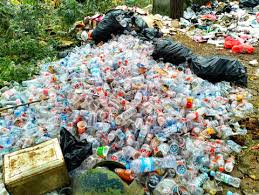India Becomes Leading Plastic Polluter

- 08 Sep 2024
India has emerged as the top global plastic polluter, releasing 9.3 million tonnes (Mt) of plastic annually, accounting for nearly 20% of the world's total plastic emissions.
Top Plastic Polluters:
- India: 9.3 Mt
- Nigeria: 3.5 Mt
- Indonesia: 3.4 Mt
- China: Previously first, now fourth, due to improvements in waste management practices such as incineration and controlled landfills.
Understanding Plastic Emissions
Plastic emissions refer to plastic that escapes from managed systems into unmanaged or uncontrolled environments. These emissions can occur throughout the lifecycle of plastic, from production through to disposal.
Intergovernmental Negotiating Committee (INC)
The INC, established by the United Nations Environment Programme (UNEP) in 2022, is working towards creating a global binding treaty on plastic pollution. The committee addresses the entire plastic lifecycle:
- INC Sessions:
- INC-1: Punta del Este, Uruguay (November 2022)
- INC-2: Paris, France (May – June 2023)
- INC-3: Nairobi, Kenya (December 2023)
- INC-4: Ottawa, Canada (2024)
- INC-5: Scheduled for South Korea (November 2024)
Status of Waste Generation in India
- Underreported Waste Generation: Official figures estimate 0.12 kilograms per person per day, which may be higher in reality.
- Excluded Data:
- Waste from rural areas.
- Waste recycled by the informal sector.
- Open burning of uncollected waste.
Global Trends in Plastic Pollution
- Sources of Pollution:
- Global North: Littering is a major contributor.
- Global South: Uncollected waste is the primary source of plastic pollution.
- Top Polluting Countries: 69% of global plastic waste emissions come from 20 countries, mostly low- and middle-income nations.
- High-Income Countries: Although these countries produce more plastic waste, their advanced waste management systems prevent them from being top polluters.
India's Initiatives to Address Plastic Waste
- UNDP India’s Plastic Waste Management Program (2018-2024): Focuses on improving plastic waste management practices.
- Ban on Single-Use Plastics (SUP): Prohibits the manufacture, import, sale, and use of plastic bags thinner than 120 microns.
- Plastic Waste Management Rules (2022): Introduces Extended Producer Responsibility (EPR) for plastic packaging, with targets for recycling, reusing, and using recycled plastic.
- Swachh Bharat Mission: Launched in 2014 to improve waste management and eliminate open defecation.
- India Plastics Pact: Aims to transform the plastic lifecycle.
- Project REPLAN: Focuses on creating carry bags from a blend of plastic waste and cotton fibers.
- Un-Plastic Collective: Promotes a circular economy to reduce unnecessary plastic use and environmental impact.
- GoLitter Partnerships Project: Targets reducing marine plastic litter from fisheries and shipping.
Global Initiatives to Combat Plastic Pollution
- Closing the Loop: A UN Economic and Social Commission for Asia and the Pacific project to develop policies addressing plastic waste.
- Global Tourism Plastics Initiative: Aims to reduce plastic pollution from the tourism sector by 2025.
- EU Single-Use Plastics Directive (2021): Seeks to minimize plastic waste in the environment.
